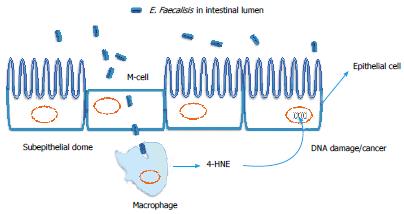Copyright
©2014 Baishideng Publishing Group Co.
World J Gastrointest Oncol. Mar 15, 2014; 6(3): 55-66
Published online Mar 15, 2014. doi: 10.4251/wjgo.v6.i3.55
Published online Mar 15, 2014. doi: 10.4251/wjgo.v6.i3.55
Figure 3 Role of pro-oxidant intestinal bacteria in colorectal cancer.
Enterococcus faecalis (E. faecalis) an intestinal bacteria with the unique ability to generate superoxide radicals. Intestinal microfold cells (M-cells) may transport E. faecalis from the intestinal lumen to macrophages in the subepithelial dome where macrophage cyclooxygenase-2 (COX-2) and lipid peroxidation can generate 4-hydroxynonenal (4-HNE), which promotes DNA damage/chromosomal instability to nearby epithelial cells[20].
- Citation: Stone WL, Krishnan K, Campbell SE, Palau VE. The role of antioxidants and pro-oxidants in colon cancer. World J Gastrointest Oncol 2014; 6(3): 55-66
- URL: https://www.wjgnet.com/1948-5204/full/v6/i3/55.htm
- DOI: https://dx.doi.org/10.4251/wjgo.v6.i3.55









